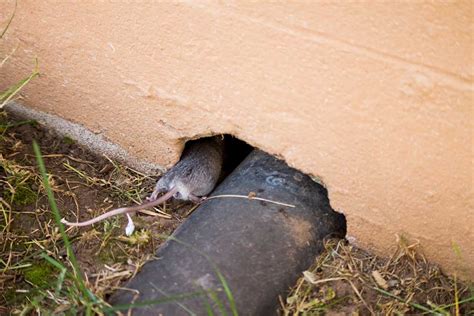How Are Mice Getting In My Basement
Ronan Farrow
Apr 03, 2025 · 3 min read

Table of Contents
How Are Mice Getting Into My Basement? A Comprehensive Guide to Rodent Entry Points
Mice in your basement? It's a common problem, but a solvable one. Understanding how they're getting in is the first step to effective mouse control. This guide will explore common entry points and offer practical solutions to keep your basement mouse-free.
Common Entry Points for Mice in Your Basement
Mice are surprisingly small and agile, able to squeeze through incredibly tiny gaps. Here are some of the most frequent culprits:
1. Cracks and Gaps in the Foundation:
- Where to look: Inspect your foundation walls carefully, both inside and outside. Pay close attention to areas around pipes, wires, and utility entrances. Even a small crack can be enough for a mouse to wriggle through.
- Solutions: Seal cracks and gaps with caulk or expanding foam sealant. Ensure a complete seal to prevent re-entry.
2. Gaps Around Doors and Windows:
- Where to look: Check the seals around basement doors and windows. Look for gaps at the frame, around the threshold, and under the door.
- Solutions: Install weatherstripping or door sweeps to seal gaps. Replace damaged window frames and seals.
3. Openings Around Pipes and Wires:
- Where to look: Mice often use openings around pipes and wires that penetrate the foundation as entry points. Check for gaps where these utilities enter your basement.
- Solutions: Seal around pipes and wires with steel wool, caulk, or expanding foam. Steel wool is particularly effective because mice can't chew through it.
4. Damaged or Missing Screens:
- Where to look: Check all basement windows and vents for damaged or missing screens.
- Solutions: Repair or replace damaged screens, ensuring there are no gaps or holes.
5. Unsealed Utility Pipes:
- Where to look: Examine all utility pipes entering the basement, including sewer lines, gas lines, and water lines.
- Solutions: Contact a professional to inspect and seal any gaps.
6. Vents and Chimneys:
- Where to look: Check for gaps or openings in basement vents and chimneys. Mice can use these as easy access points.
- Solutions: Install mesh screens over vents and ensure your chimney is properly sealed.
Preventing Future Infestations
Even after sealing entry points, proactive measures are crucial:
- Regular Inspections: Regularly inspect your basement for signs of mouse activity, such as droppings, tracks, or gnaw marks.
- Cleanliness: Maintain a clean basement. Remove clutter, food scraps, and anything that might attract mice.
- Storage: Store food in airtight containers.
- Landscaping: Keep vegetation trimmed away from your foundation to reduce potential hiding places.
When to Call a Professional
If you've tried these methods and still have a mouse problem, it's time to call a pest control professional. They have the expertise and tools to effectively eliminate the infestation and provide ongoing prevention.
This comprehensive guide should help you identify and address how mice are getting into your basement. By diligently sealing entry points and practicing preventative measures, you can significantly reduce the chances of a future infestation. Remember, a mouse-free basement is a healthier and more comfortable living space.
Featured Posts
Also read the following articles
| Article Title | Date |
|---|---|
| How To Use A Deer Decoy | Apr 03, 2025 |
| Macon Controls Thermostat How To Use | Apr 03, 2025 |
| How To Watch Tv While Tailgating | Apr 03, 2025 |
| Carne Asada Trader Joes How To Cook | Apr 03, 2025 |
| How Will Measure Your Life Pdf | Apr 03, 2025 |
Latest Posts
-
How Hard Is Dental Assisting
Apr 04, 2025
-
How Hard Does Polymeric Sand Get
Apr 04, 2025
-
How Great Though Art Sheet Music
Apr 04, 2025
-
How Great Thou Art Trumpet Sheet Music
Apr 04, 2025
-
How Great Thou Art Sheet Music Trumpet
Apr 04, 2025
Thank you for visiting our website which covers about How Are Mice Getting In My Basement . We hope the information provided has been useful to you. Feel free to contact us if you have any questions or need further assistance. See you next time and don't miss to bookmark.
